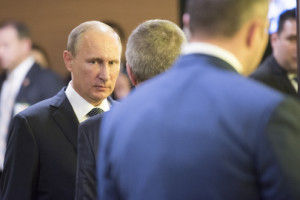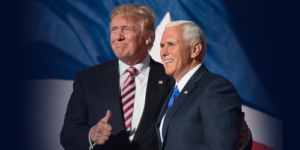
Gilbert Doctorow, Ph.D.
Gilbert Doctorow is the European Coordinator of The American Committee for East West Accord Ltd and a Senior Research Fellow of the American University in Moscow. His most recent book Does Russia Have a Future? was published in August 2015.
With Hillary Clinton calling Donald Trump a Russian "puppet” and Trump calling her a "nasty woman,” the third presidential debate descended into personal insults that had special resonance in Russia, as Gilbert Doctorow describes.
In a recent essay, former CIA analyst Paul Pillar pointed to how this year’s presidential race has projected a poor image of U.S. democracy onto the world stage. He put the blame mainly, though not exclusively, at the door of Donald Trump, beginning with the allegations of his sexually assaulting women and ending in his refusal to be bound by the results of the ballot on Nov. 8. This, Pillar remarked, put in question our whole political process and exposed us to ridicule abroad which undermines our soft power.
But exactly what impression has the U.S. presidential campaign had on the chattering classes in Russia, the country that the leadership in Washington has identified as the single adversary in world politics which poses an existential threat to the U.S. and the foreign country which has been mentioned most frequently by far by both candidates in the three debates?

Russian President Vladimir Putin, following his address to the UN General Assembly on Sept. 28, 2015. (UN Photo)
For this little study, I have selected the Oct. 20 broadcast of the widely watched political talk show, Evening with Vladimir Soloviev on Russian State television’s Channel One. Soloviev’s prime-time show has a high quality production team and this broadcast was dedicated to analysis of the third debate, with secondary attention to the news surrounding the (Russian-led) fight for east Aleppo in Syria and (U.S.-led) fight for Mosul in Iraq.
The panel of six, which rotated some out and others in over the course of the nearly two-hour show, consisted of both Russians and invited foreign guests. The former were mostly political scientists and directors of research institutes in international relations, i.e., persons with high professional qualifications relevant to the subject matter of the evening plus three politicians, of whom the most colorful and voluble was Vladimir Zhirinovsky, leader of the [opposition] nationalist LDPR party. His party today holds the chair of the Duma’s foreign affairs committee. The second politician was from the ruling United Russia party and is a member of the foreign relations committee of the upper house, the Federation Council.
But the third bears separate mention because he represents the liberal politicians from the Yeltsin years who are so beloved by the America elites who see these liberals as the pioneers of democracy in Russia whom Vladimir Putin’s government has crushed. Sergey Stankevich was in the Yeltsin circle but fell afoul of the boss in 1995 when he was seen backing a rival, St. Petersburg former mayor Anatoly Sobchak, for the 1996 presidential election. Stankevich fled Russia for Poland where he was given refugee status. Like Sobchak, he was eventually pardoned and returned to Moscow in 1999. He is now chairman of the Committee on International Relations of the "Party of Growth” representing small- and medium-size businesses. In the September elections, the party failed to cross the necessary percentage threshold to gain seats in the Duma.
The foreigners were all were former citizens of the Soviet Union and fluent Russian speakers holding professional positions as social activists, academics and journalists in the countries where they now live – the U.S. and Israel. Their political views could be assumed to be very different from each other, not to mention their being different from the Kremlin’s political line. On the face of it, they were selected precisely to generate heated discussion as the audiences for these talk shows expect.
The biographical details of two of these foreign panelists are as follows:
Yakov Kedmi is described in his Wikipedia (RU) entry as a retired former head of communications in the Israeli agency Nativ, whose mission was to draw Jews from the Soviet Union and Eastern Europe to settle in Israel. Kedmi himself was one of the earliest Jewish campaigners to emigrate from the USSR (1969) and the first to issue a programmatic statement justifying this choice. Suspected of being an intelligence operative, he was barred from entering Russia until 2015. He is said to have great influence among the Russian-speaking community in Israel.
Nikolai Zlobin has a Ph.D. in history, has held various academic positions in Russia while serving as an adviser to Soviet President Mikhail Gorbachev and later to President Boris Yeltsin. He left for the U.S. in 1993 and has held teaching and research positions in prestigious centers of higher learning there while carrying on extensive publications in the mainstream periodical press from his base in Washington, D.C. He has met with Putin several times and circulates in high political circles. As Wikipedia (RU)tells us: "He is known as a tough critic of Russian policies, though there is also the opposite opinion that privately he supports them.”
Bemused Unanimity
The single most important conclusion from the Evening with Vladimir Soloviev was that, notwithstanding the very diverse panel, there was a bemused unanimity among them regarding the U.S. presidential campaign: that it has been deplorable. They found both candidates to be disgraceful due to their flagrant weaknesses of character and/or records in office, but they were also disturbed by the whole political process. Particular attention was devoted to the very one-sided position of the American mass media and the political establishments of both parties for one candidate, Hillary Clinton.

Former Secretary of State Hillary Clinton speaking at Planned Parenthood Action Fund membership event at the Washington Hilton on June 10, 2016. (Photo by Lorie Shaull, Wikipedia)
When Russians and former Russians use the terms "McCarthyism” and "managed democracy” to describe the American political process, as they did on the show, they know acutely well whereof they speak.
Though flamboyant in his language, populist politician Vladimir Zhirinovsky touched on a number of core concerns about the debate and the candidates:
"The debates were weak. The two cannot greet one another on stage, cannot say goodbye to one another at the end. They barely can get out the texts that have been prepared for them by their respective staffs. Repeating on stage what one may have said in the locker room. Billions of people around the world conclude with one word: disgrace! This is the worst electoral campaign ever. And mostly what we see is the style of the campaign.
"However much people criticize the USSR – the old fogies who ran it, one and the same, supposedly the conscience of the world, now we see the same thing in the USA: the exceptional country – the country that has bases everywhere, soldiers everywhere, is bombing everywhere in some city or other. They are making their ‘experiments.’ The next experiment is to have a woman in the White House. It will end badly. Hillary has some kind of dependency. A passion for power – and that is dangerous for the person who will have her finger on the nuclear button. If she wins, on Nov. 9th the world will be at the brink of a big war…”
An equally colorful evaluation was presented by Yakov Kedmi, the Russian immigrant to Israel:
"This is the most dirty campaign in U.S. history. It has slipped below the belt. The astonishing cynicism of this campaign! Mme Clinton is speculating on the vulgar things that Trump spoke 15 years ago. [Editor: Actually, Trump’s "Access Hollywood” hot-mic comments about groping women were in 2005.] But compared to what her husband did in the White House, Trump is almost a monk.
"If Hillary thinks her husband was worthy of being president for two terms, how can she think of saying that Trump is unfit for having had frivolous behavior towards women 15 years ago. Not to mention the behavior of previous presidents. [John F. Kennedy] would call time out in a cabinet session to go next door for a quickie with a prostitute. His brother, who if he had not been murdered would also have been a presidential candidate, when he visited Moscow asked for the services of hard-currency prostitutes. Looking at their behavior, if it did not prevent Kennedy from being a good president, in the understanding of Americans, if it didn’t prevent the husband of Mme Clinton, who sat in the hall during the debates, from turning the White House into his personal bordello, so what do you want from Trump?
"If you have no other claims against him, you talk about the ‘hand of Moscow.’ It’s like here in the 1930s: if you didn’t like someone you accused him of being a Trotskyite. That was enough – it was a death sentence. Now in the USA, you are ‘a friend of Putin.’ Nothing more is needed. It’s just like in the times of the McCarthy Committee.”
Zhirinovsky made no secret of his partiality for Trump, calling him "clean” and "a good man” whereas Hillary has "blood on her hands” for the deaths of hundreds of thousands due to her policies as Secretary of State. But the final word on Russia’s electoral preferences was given by the moderator, Vladimir Soloviev: "There can be no illusions. Both Trump and Clinton have a very bad attitude to Russia. What Trump said about us and Syria was no compliment at all. The main theme of American political life right now is McCarthyism and anti-Russian hysteria.”
While most commentary dealt with the personalities of the candidates, Stankevich, the Yeltsin-era "liberal,” drilled down on the substance of policy, saying: "Both candidates are bad. Neither has shown they have a plan to move America forward or to respond to its present challenges: how to revive industry, return jobs, bring back capital. In foreign affairs, the overblown issue of Russia dominated.
"Clinton has gone beyond all prior claims regarding American exceptionalism. All of this is repeated in the most indecent manner. Trump lost the debates. He didn’t exploit the obvious weaknesses of Clinton. The task in the last debate was to show that he is ready to be the president. He didn’t do that and instead he made a fatal mistake by not agreeing to abide by the results of the election.”
Grudging Respect
This being Russia, one might assume that the deeply negative views of the ongoing presidential election reflect a general hostility toward the U.S. on the part of the presenter and panelists. But nothing of the sort came out from their discussion. To be sure, there was the odd outburst from Zhirinovsky, who repeated a catchy line that he has delivered at other talk shows: essentially that the U.S. is eating Russia’s and the world’s lunch given that it consumes the best 40 percent of what the world produces while it itself accounts for just 20 percent of world GDP.

Donald Trump and vice presidential nominee Mike Pence during Day Three of the Republican National Convention. (Photo credit: Grant Miller/RNC)
But otherwise the panelists, including Zhirinovsky, displayed informed respect and even admiration for what the United States has achieved and represents, praising its "strongest economy,” its efficient "conditions for business,” the need not "to demonize it,” how "attractive” it is "to the most intelligent people of the world,” how "top people” earn more money there.
It is true that the panelists held up to ridicule the current political correctness in the United States, but what the panelists really objected to was "American exceptionalism,” its belief that it has the right to intervene in every country, in every conflict and to impose its own solutions.
How are we to understand the discrepancy between the very low marks they give the U.S. presidential race and their generally favorable marks for the U.S. as an economic and military powerhouse? It appears to result from the understanding of several of the panelists that there is a disconnect between Washington, including the presidency, and what makes the economy work.
To their understanding, aside from foreign policy, the U.S. president has little effective power. However, after that, a certain idealized view of how power is distributed enters into their calculations. They believe most Americans see and are interested only in local government from their communities up to the governorship of their state, and the economy is still further decentralized, depending on private initiative. This they contrast, favorably, with Russia’s highly centralized political and economic decision-making. Thus, the panelists conclude that the U.S. has a political leadership at the national level that is unworthy and inappropriate to its position in the world. On this point, many Americans might agree.
Finally, let us consider the answer that panelists gave to the question the moderator posed, almost rhetorically when he said that neither candidate for the presidency was good news for Russia: what is to be done? The answer came in the last part of the program, when the latest events on the Syrian front came into focus.
The answer was given by a Russian panelist, Vyacheslav Matuzov, president of the society for friendship with Arab countries:
"We have to keep in mind that we are in confrontation with the world’s most powerful nation. Therefore we should not expect some other behavior towards us. If we have decided that we are going to help Syria liberate Aleppo, then we must do this. For that we have not only the Kalibr rockets but also the aircraft carrier Kuznetsov. I think firmness, no steps backward, is one of the most important elements. There is great psychological pressure on us. I don’t know how our leadership will resist this pressure. We should, I think. Our sending our eight ships from the Northern Fleet is a demonstration of our determination.”
To this the moderator interjected: "For the first time in 40 years we have stopped America from implementing its plans. What has happened in Syria is a colossal defeat for Obama. What they cannot forgive is that Russia has completely altered the situation in Syria.”
Matuzov resumed: "There is a distinction between threat and start of war. This is a boundary that everyone is trying to find. We and the Americans are each showing our determination. They are relying more on diplomacy and psychological effect. Our response is what we are now doing [moving in the Russian North Sea Fleet]”
This tough line found instant support from Zhirinovsky: "Let our Northern Fleet enjoy southern climes for a while, and show our might. Hillary in the last debate said their main achievement was the most powerful army. But they have not had any victory against another powerful army. Only against very small countries. This is our big chance. We are doing a noble deed. Armies need a battlefield and we expect to be victorious. Meanwhile, the Syrian army is spoiling for a fight. They can’t wait to raise their flag over all the cities of eastern Syria.”
The final word came from the Israeli Yakov Kedmi: "Putin told [German Chancellor Angela] Merkel and [French President Francois] Hollande let’s discuss the political solution in Syria after the fighting is over. This means he is certain Aleppo will be taken soon, followed by Idlib and the whole of Syria. Then the discussion of the political solution in Syria can begin with the next US president.”
But the problem for the world is what happens when American determination and Russian determination meet head on in the tinder box that is the Syrian civil war.



_jpg/250px-ElbeDay1945_(NARA_ww2-121).jpg)





